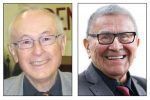Robbie Waisman, left, and Chief Robert Joseph, will speak at Temple Sholom’s Selichot program Sept. 1. (photos from Temple Sholom)
Two men who have built bridges between Canada’s indigenous and Jewish communities will speak about reconciliation, forgiveness and resilience at Temple Sholom’s Selichot program.
Robbie Waisman, a survivor of the Holocaust who was liberated as a child from Buchenwald concentration camp, and Chief Robert Joseph, a survivor of Canada’s Indian residential schools system, will address congregants on the subject of Forgiving But Not Forgetting: Reconciliation in Moving Forward Through Trauma. The event is at the synagogue on Sept. 1, 8 p.m.
Waisman is one of 426 children who survived Buchenwald. At the age of 14, he discovered that almost his entire family had been murdered. He came to Canada as part of the Canadian War Orphans Project, which brought 1,123 Jewish children here under the auspices of Canadian Jewish Congress.
Joseph is a hereditary chief of the Gwawaenuk First Nation, located around Queen Charlotte Strait in northern British Columbia. He spent 10 years at St. Michael’s Indian Residential School at Alert Bay on the central coast of the province. He recalls being beaten for using his mother tongue and surviving other hardships and abuse. A leading voice in Canada’s dialogue around truth and reconciliation, the chief is currently the ambassador for Reconciliation Canada and a member of the National Assembly of First Nations Elders Council. He was formerly the executive director of the Indian Residential School Survivors Society and is an honourary witness to Canada’s Truth and Reconciliation Commission.
Waisman and Joseph have become close friends over years of discussing, publicly and privately, their respective histories and the challenges of building a life after trauma. Waisman has become a leading Jewish advocate for indigenous Canadians’ rights.
“I think we have a duty and obligation to give them a stand in the world,” Waisman said. “For many, many years, many people ignored them, and their story about truth and reconciliation was just in the background, they weren’t important. I think that now that we give them an importance – and it is important that they speak up and speak about their history and so on – [it is possible] to make this a better world for them.”
Waisman believes that the experiences of Holocaust survivors and the example that many survivors have set of assimilating their life’s tragedies and committing themselves to tikkun olam is a potential model for First Nations as they confront their past and struggle to address its contemporary impacts.
“We were 426 youngsters who survived Buchenwald and the experts thought that we were finished,” Waisman said of his cohort of survivors, who have been immortalized in The Boys of Buchenwald, a film by Vancouverites David Paperny and Audrey Mehler, and in a book by Sir Martin Gilbert. “We wouldn’t amount to anything because we’d seen so much and we’d suffered so much and lost so much. And look what we have accomplished. We have little Lulek [Rabbi Yisrael Meir Lau], who became the chief rabbi of Israel, Eli Wiesel, Nobel Peace Prize winner, and I can go on and on. When I speak to First Nations, I say, ‘look what we’ve done,’ and then I quote [Barack] Obama and say, ‘Yes, you can.’”
One of Waisman’s first experiences with Canadian indigenous communities was when he was invited to the Yukon. His presentation was broadcast on CBC radio and people called in from all over the territory, asking that Waisman wait for them so that they could come meet him.
“They kept phoning in and saying, ‘Don’t let Robbie leave, we are coming in to see him,’” Waisman recalled. “It was just amazing. I would sit on a chair and they would come and touch me and then form themselves in a circle and, for the first time, they were speaking about their horrors and how to move on with life.”
This was a moment when Waisman realized the power of his personal story to help others who have experienced trauma gain strength.
The Selichot program was envisioned by Shirley Cohn and the Temple Sholom Working Group on Indigenous Reconciliation and Community, which Cohn chairs.
“It’s the right thing to do given the political atmosphere, the increased awareness about indigenous issues and just the fact that, as Jews, I think we need to be more tolerant of others, and these are really the first people in Canada, and they’ve suffered discrimination, as we have, and I think it’s important,” she said.
The message is especially relevant at this time of penitence and self-reflection, she added. “It’s a time for thoughtfulness and looking inward,” said Cohn, who is a social worker.
Rabbi Carrie Brown said the Temple Sholom community sees the topic as fitting.
“We want to look at this further as a congregation,” said Brown. “Selichot is a time of year when we really start to think about ourselves as individuals and ourselves as a community and the conversation between Robbie Waisman and Chief Joseph really fits nicely into that, about trauma and reconciliation and forgiveness and all of these major themes of the season.”
This is “not just a one-off program,” the rabbi stressed, but the beginning of a process of education and conversation.

